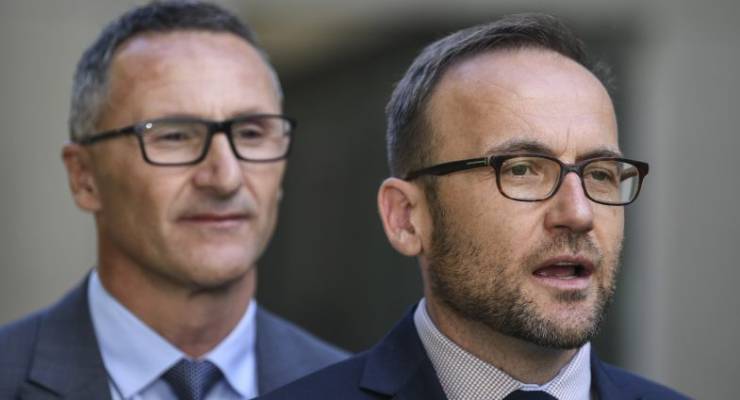
In the days after the Christchurch shooting, a nasty trope began to emerge in the far-right online sludge. On a website dedicated to prominent British Islamophobe Tommy Robinson, a local right wing extremist wrote an article arguing that the Greens and other outspoken voices on the left somehow bore responsibility for the terrorist attack through their cultivation of so-called “anti-white racism”.
Within a week, this trope had memed its way into the soundbites of federal MPs, national news sites and live TV. Peter Dutton paved the way last Monday when he claimed the Greens were just as bad as Fraser Anning, the neo-Nazi sympathiser who blamed Muslim immigration for the Christchurch attack.
Deputy Prime Minister Michael McCormack echoed this, arguing they were “much more of a danger to our social fabric than any other party”. Soon, this sentiment had hardened, with Andrew Bolt arguing that the Greens had “blood on their hands” over the Christchurch attack. Then Liberal Party vice-president Teena McQueen accused Greens leader Richard Di Natale of hate speech and inciting violence on ABC’s Q&A. As pressure mounted on Scott Morrison to not preference One Nation following the Al Jazeera sting, at least two Liberal MPs came out arguing that the Greens were in fact the most dangerous political organisation in the country.
This latest round of baffling Greens-bashing, as opposed to genuine policy disagreement, points to two prominent themes in the discourse of the Australian right. Firstly, it shows how quickly talking points from the internet’s reactionary basement enter into mainstream political discourse. Second, it is another example of a recurring tactic on the right: blame the Greens for everything — from natural disasters to regional poverty.
From the sewer to Senate
The “Greens did Christchurch” trope is an almost textbook example of the life cycle of a far-right meme. The meme will usually originate on message boards or ad-riddled right-wing “news” sites before eventually being picked up by News Corp culture warriors and metastasizing into the language of mainstream politicians who give it oxygen and legitimacy.
The recent history of Australian politics is littered with other examples of the pipeline between the right-wing trollosphere and parliament.
Pauline Hanson’s Senate motion, saying “it’s OK to be white” referenced a phrase which originated on neo-Nazi message boards. Liberal senators decided to vote in favour of it, though they later said it was because of an “administrative error”.
Earlier in the year, Home Affairs Minister Peter Dutton was reportedly considering fast-tracking visas for white South African farmers who he argued faced persecution and violence. Many in the right-wing media agreed that this was a troubling instance of “reverse racism”. But this sudden concern for white South African farmers didn’t happen overnight. Instead, it has been mobilised as part of a conspiratorial alt-right narrative about white genocide. Within months Donald Trump was also talking about the farmers.
Some talking points are now so ubiquitous among figures on the Australian right, their deeply troubling origins are all but forgotten. The myth that Western culture is under siege from a shadowy cabal of “cultural Marxists”, which has its origins in an anti-Semitic conspiracy theory about Jewish academics, has enthralled people like Nine political editor Chris Uhlmann and Australian Conservatives leader Cory Bernardi. Norwegian far-right mass shooter Anders Breivik was also a believer.
When in doubt, blame the Greens
The post-Christchurch blame game also highlights the often absurd lengths many on the right go to to blame the Greens for, well, almost everything. News Corp columnist Miranda Devine particularly excels. In 2009, then writing in The Sydney Morning Herald, she blamed “greenies” for the Black Saturday bushfires, a claim she has repeatedly come back to, and which she still stood by 10 years later.
Their environmental stance, particularly opposition to mining and push for renewable energy, is frequently blamed for potentially destroying industries, and impoverishing regional Australia.
Wannabe Liberal MP Warren Mundine accused them of being determined to keep poor people poor by opposing mining. When mining giant Glencore announced it would not be opening new coal mines because of climate-related risks, Coalition MPs blamed “latte-sipping Greens” for attempting to destroy the mining industry. Meanwhile, stance on Israel has seen them labelled “a party of ignorant extremists”. Recently, Dutton claimed activist group GetUp, which is campaigning to unseat him, was controlled by the Greens.
This week’s anti-Greens attacks are hardly new for the Coalition. Partly this is a standard form of political deflection. But the combination of “extremely online” right-wing fragments and latent anti-Greens sentiment made it an irresistible bit of political posturing for many on the right.








Crikey is committed to hosting lively discussions. Help us keep the conversation useful, interesting and welcoming. We aim to publish comments quickly in the interest of promoting robust conversation, but we’re a small team and we deploy filters to protect against legal risk. Occasionally your comment may be held up while we review, but we’re working as fast as we can to keep the conversation rolling.
The Crikey comment section is members-only content. Please subscribe to leave a comment.
The Crikey comment section is members-only content. Please login to leave a comment.